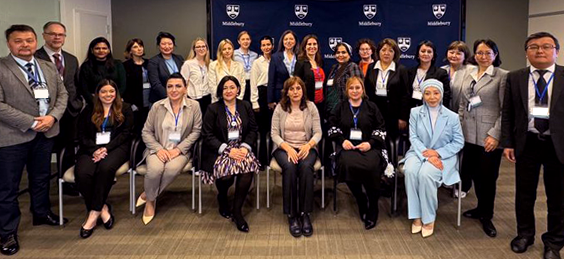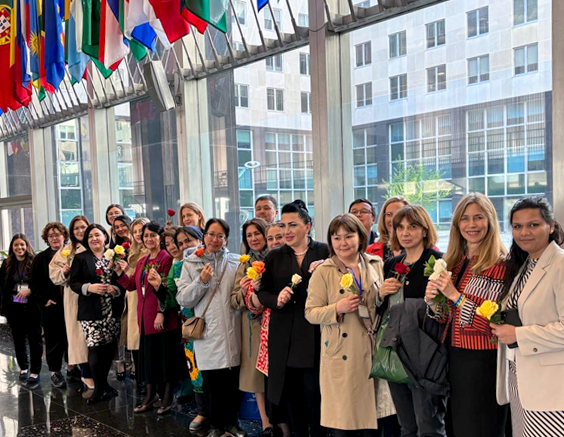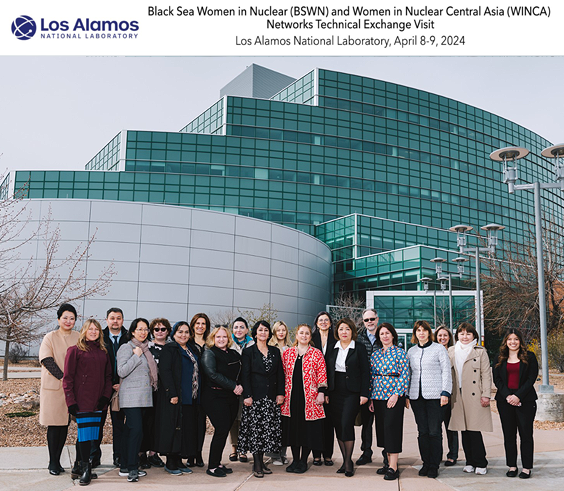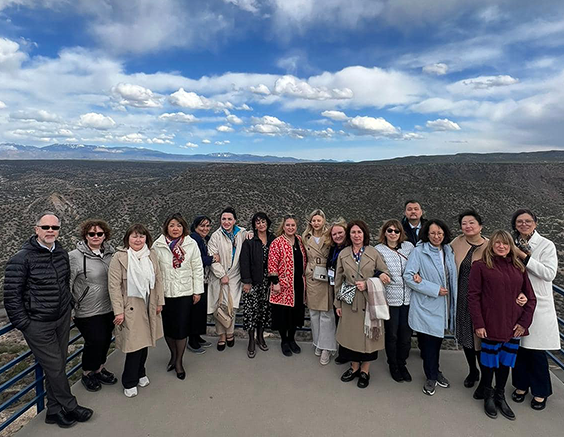June 20, 2024
Margarita Kalinina-Pohl, Shahneela Tariq, Emma Scherer
CNS, jointly with the U.S. Department of Energy’s National Nuclear Security Administration (DOE/NNSA), and Los Alamos and Sandia National Laboratories, co-hosted a technical exchange to the United States for over 20 professionals from the Black Sea Women in Nuclear Network (BSWN) and Women in Nuclear Central Asia Network (WINCA). Program participants represented government bodies, training and research facilities, academia, industry, and civil society. BSWN and WINCA networks were established in partnership with the DOE/NNSA Nuclear Security Women Initiative (NSW) and Los Alamos National Laboratory (LANL).
The technical exchange took place on April 1-12 in the form of two modules: the Washington, DC module and the New Mexico module (Los Alamos and Sandia National Laboratories). The program’s objectives were twofold: to introduce the BSWN and WINCA networks to a wide range of stakeholders within the U.S. policy and nuclear security science and research communities, and to engage in dialogue and professional exchanges with U.S. peers on recent developments in these fields and share good practices in promoting diversity, equity, inclusion, and accessibility (DEIA) policies in their respective organizations. The visit was supported and co-hosted by DOE/NNSA, LANL, and Sandia.
Washington, DC Module

BSWN-WINCA group in CNS DC office
The Washington, DC module, co-hosted by CNS and LANL DC offices, started with a welcoming address by Ian Stewart, Executive Director of the CNS DC office. BSWN and WINCA leaders, Nataliia Klos and Zarina Sayfieva, provided progress updates from their networks and discussed the networks’ activities. CNS DC-based Nomsa Ndongwe and Sophia Poteet conducted an interactive exercise with the group, putting in practice leadership skills from The CliftonStrengths® Assessment tool.
The first day’s program also featured a special guest – Unica Viramontes, Associate Director for Defense Protection Programs at LANL. Viramontes, who joined the group virtually, shared her career path as a Hispanic woman from her entry-level position to a top leadership role in the U.S leading national laboratory. She also discussed her perspectives on diversity, inclusion, equity, and the sense of belonging within large nuclear security organizations.
The program also included two substantive panels: Nuclear Energy Developments in Central Asia, and Nuclear Security Challenges. The panel moderated by Togzhan Kassenova featured regional experts from Kazakhstan, Kyrgyzstan, and Uzbekistan (Dauren Aben, Togzhan Seyfullina, Dinara Ashimova, and Marina Li). The panel addressed Central Asian countries’ nuclear energy aspirations and developments, including a NPP construction in Uzbekistan, plans to start NPP construction in Kazakhstan, and adding nuclear energy to Kyrgyzstan’s national energy program. The experts described the benefits and challenges associated with nuclear energy development in the region, especially in the current geopolitical situation. CNS experts Miles Pomper and Margarita Kalinina-Pohl led a discussion on the topic “Nuclear Security Challenges: Global and Regional Perspectives,” which addressed common problems that both regions face, including Soviet nuclear legacies, orphan radioactive sources, and threats to nuclear security emanating from military conflicts and contested territories.
The visit continued with meetings with Washington DC-based nongovernmental and professional organizations including the Stimson Center, Women in International Security (WIIS), Nuclear Threat Initiative, CRDF Global, and U.S. Women in Nuclear (U.S WIN). Lively discussions and interactions that occurred during these meetings focused mainly on DEIA topics, including biases in nuclear security implementation as revealed in a recently published policy paper by Stimson Center, WIIS activities to advance women in peace and security-related fields, NTI work on advancing gender equity in the nuclear policy community, and how U.S. WIN supports and promotes women in nuclear fields.
The organizers devoted a full day to meetings with various DOE/NNSA offices, including the Office of International Nuclear Security (INS) that sponsors both networks. Christine Bent, Associate Deputy Administrator for Global Material Security, DOE NNSA Office for Global Material Security (GMS), greeted the group with opening remarks focused on activities that her Office covers, as well as examples of DEIA related work and events supported by GMS.
Representatives from the INS Office, Offices of Radiological Security (ORS), and Nuclear Smuggling Detection and Deterrence (NSDD) gave overviews of their respective programs and key activities. Scott Shrum, INS Office Director, highlighted the role that INS plays in advancing DEIA as an important part of nuclear security culture, also noting other INS key activities in this area. Lindsey Gehrig from the Pacific Northwest National Laboratory led a discussion about the INS Nuclear Security Women Initiative.
BSWN and WINCA representatives followed suit with presentations about their countries and organizations’ activities focusing on advancing women in nuclear security and related fields. These included Madalina Stefanic’s (Romania) talk about the BSWN mentorship program, Zumrat Gaibullaeva’s (Tajikistan) overview of the Central Asian regional conference for women in science and technology, and Nurgul Kurmangalieva’s overview of the Kazakh National Nuclear Center.
Presentations by Craig Percy, American Nuclear Society (ANS) CEO, about ANS and their DEI commitments, and by Joy Furguson, DOE NNSA about Women in Strategic Trade Initiative (WIST) concluded this very informative and discussions-oriented segment of the program.

Black Sea and Central Asia experts’ visit to the U.S. Department of State
The last day of the Washington, DC module included a session where BSWN leadership shared their best practices in running and sustaining the network. These practices include impactful activities, such as NucTalk series, the mentorship program, an active WhatsApp group, network promotion in social media, and professional opportunities for their members, such as speaking engagements and participation in conferences.
The module concluded with a program at the U.S. Department of State, where Ann Ganzer, Principal Deputy Assistant Secretary of the International Security and Nonproliferation Bureau (ISN) and Jennie Gromoll, Senior Advisor for Europe and Eurasia provided an overview of ISN’s policy issues and offices. Participants discussed the importance of regional initiatives for women in the nuclear field. ISN has ensured that the Black Sea and Central Asian Networks were highlighted in the G7 Nonproliferation Directors Group statement.
Heidi Mulholland, ISN Export Control and Border Security (EXBS) Office Advisor for Ukraine presented an overview of EXBS’s work in capacity building in Black Sea countries, and the importance of Strategic Trade Controls (STCs). This was followed by a discussion on collaboration in Central Asia on monitoring trade flows and new strategic trade control laws in Ukraine. The visit also included a tour of the National and Nuclear Risk Reduction Center (NNRRC), which acts as a 24/7 hotline between the U.S. and other countries by exchanging messages on nuclear and conventional weapons, giving notice of ballistic missile launches, overseeing the destruction of chemical weapons, and addressing international cyber incidents. The participants had the opportunity to exchange their views on future collaborations. The visit concluded with a presentation on the Global Partnership by Kathleen Lowe, Deputy Program Division Chief, Office of WMD Terrorism.
New Mexico Module

After Washington, DC the group headed to two cities in New Mexico: Santa Fe and Albuquerque. The New Mexico module, organized by LANL and Sandia, included visits and exchanges at their sites, tours of museums, and other facilities associated with these laboratories. This module strove to introduce both networks to the labs’ technical and policy experts and share best practices in promoting DEIA policies in these two prominent U.S. national laboratories. The LANL program opened with welcoming remarks by Mark Chadwick, LANL Acting Deputy Director for Science, Technology and Engineering and Michael Baker, LANL Global Security Chief Operating Officer. Nina Rosenberg, LANL Program Director for Nuclear Security and Nonproliferation, provided an overview of the LANL programs focusing on nuclear security. Other project managers and leads shared their work and activities in nuclear security and nuclear material control and accounting, including live demonstrations and presentations on unmanned aerial systems (UAS) and counter UAS measures. Technical components also included a tour of the nuclear material nondestructive assay laboratories, Manhattan Historical Park Tour, and a visit to the Bradbury Science Museum.
The DEIA portion included a working lunch with LANL early-career women in STEM, an overview of LANL DEIA programs by the LANL Diversity Officer Katherine Haight, and a presentation of current LANL statistics in DEIA context supported by specific examples. It also included a round-table discussion between BSWN-WINCA and LANL Women’s Employee Resource Groups leaders, where LANL and members of the networks discussed examples of good practices in workforce engagement, and how to share information most effectively on the importance of DEIA in nuclear security culture at national labs and international facilities engaged in nonproliferation and security work.
After the visit to LANL, Sandia National Laboratory welcomed the group. For two days its experts presented, demonstrated, and discussed a wide range of issues with the BSWN-WINCA group – from drones’ security to diversity and inclusion. On the topic of women’s representation and diversity, Sandia representatives noted the increase of women in R&D. About a quarter of the Sandia workforce are Hispanic.
Other program activities included a tour of the Air Force Base and Kirtland Air Force Base (KAFB), as well as the National Museum of Nuclear Science and History.
The New Mexico module successfully combined briefings and conversations on topics from cutting-edge science and technologies applied to nuclear security and nonproliferation, to best practices in implementing DEIA policies in STEM communities and incorporating them in security culture to the U.S. nuclear history. BSWN-WINCA participants had a unique experience in meeting with the workforce that both labs have been building and nurturing. Moreover, they had an opportunity to learn about what science holds today and what it will offer in the future, also stepping back to learn more about the history of the Manhattan Project.

BSWN and WINCA enjoy the New Mexico scenery.
Technical Exchange: Conclusions and Participants Testimonials
The Technical Exchange introduced experts from Black Sea and Central Asia to the U.S. policy and technical community and created opportunities for future cooperation. The Washington, DC module served as an introduction to various U.S. Department of Energy and U.S. Department of State offices and programs addressing nuclear security and nonproliferation. Meetings with non-governmental organizations and professional associations bridged BSWN and WINCA with DC-based civil society working along with their U.S. government counterparts on related matters, both in nuclear fields and DEIA policies.
The New Mexico Module familiarized the participants with innovative science and technologies and their applications to nuclear security, as well as DEIA best practices and employees resource initiatives. BSWN and WINCA experts met with technical experts, saw demonstrations, and learned from the experiences, opportunities, and remaining challenges of women working at LANL and Sandia.
Some participants described their experience as follows:
“It was an amazing program, full of meetings with interesting people and visits to unique sites. I met many women, true professionals in their field, with extensive experience. Communication with [a] young employee inspired me to further development and improvement.”
“It was an incredibly informative and inspiring event that allowed me to meet with exceptional women from various fields and learn about the programs and initiatives they are implementing to support women, to be introduced to the fascinating history of laboratories and their current activities, and even visit their impressive facilities, which I never thought I would have the opportunity to see. The knowledge and insights gained from this technical visit will undoubtedly significantly impact the development of both BSWN-WINCA and my professional career.”
“The uniqueness of the program was the opportunity to participate in meetings with representatives of various governmental and non-governmental organizations and institutions of the United States. This made it possible to get acquainted with different opinions on the issues of promoting gender equality and, in particular, promoting the principles of DEI in public administration, management, and personnel management in such areas as nuclear security and nonproliferation.”
CNS expresses its gratitude to the U.S. Department of Energy’s National Nuclear Security Administration’s (DOE/NNSA), Nuclear Security Women Initiative (NSW), Los Alamos National Laboratory, and Sandia National Laboratories for their support of this program and other initiatives that CNS implements to promote DEIA in nuclear security.
